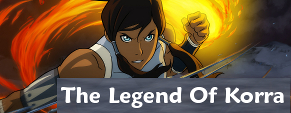Shingeki no Bahamut: Genesis – 04 Review
 I like how Favaro’s biggest problem isn’t the dangerous situations he finds himself in time and time again but how he can continue to conceal from Amira that he has no idea where Helheim is and how to get there.
I like how Favaro’s biggest problem isn’t the dangerous situations he finds himself in time and time again but how he can continue to conceal from Amira that he has no idea where Helheim is and how to get there.
The one thing that still boggles my mind about this series and Garo are that they are both adaptations. Usually with animes, stuff like mangas and visual novels get adapted and animes seldom diverge from their source-material in a radical fashion. With mangas it’s even less about creating a good anime but rather it’s all about creating animated promotion for the ongoing manga-series it’s based on. And I feel like that the anime-original endings have become less radical in recent years. Less and less it’s impossible to say that the anime does something completely different from what the manga is doing after the point where the anime ended. And so we have Garo and Shingeki no Bahamut where the creators of the source-material are seemingly okay with telling the creators of the anime to just do what they want. I know that a lot of people would like to see the animated version of the manga they’ve actually read rather than a warped version based on what some director or producer got out of it. But if you’ve got a bunch of people working on an anime-adaptation, personally I would be more interested in seeing what they would do with the source-material without being obliged to stay faithful to it.
Synopsis:
Favaro’s quest to find a way out of Amira’s epic quest continues as he stumbles onto a ship that would assumedly take both of them to Helheim. Surprisingly it just so happens that an old friend of Favaro’s father is the captain of the ship and there’s a bit of a happy reunion. While reminiscing about his father, it’s revealed that Favaro’s father was a real Robin Hood, while he lived, that is. Turns out, he did one job too many and the last one turned bad faster than he could sell off the shit they’ve taken the job for.
Meanwhile, Kaisar and Rita also find a ship to follow Favaro but it turns out the crew on their ship only had murder in mind. Unfortunately for them so did Rita after that reveal and with that she basically turned the whole crew into zombies controlled by her.
The buddy of Favaro’s father had some nasty news as well because he didn’t fancy Favaro’s father that much and instead made a deal with a demon. And now he was doing some demon’s dirty work again by capturing Favaro and Amira (while also cashing in on their bounty).
Things become a little bit more complicated as the zombie-ship with Kaisar and Rita crashes into the ship Favaro is on. Not that it would matter as that’s when the demons appear and just abduct Kaisar together with Amira.
 Only Shingeki no Bahamut would have a scene like this one! That sort of moment is exactly why this series is so much fun to watch!
Only Shingeki no Bahamut would have a scene like this one! That sort of moment is exactly why this series is so much fun to watch!
Review:
Favaro and Amira continue their adventures in this episode and that’s what the episode feels like. The series still shies away from delving into its more epic context and rather conjures up new scenarios for the characters to get involved in. At this point, though, it feels like the series can’t deliver on all the interest it has set up with its well-crafted story. Since the story was this quirky fun adventure from the very beginning it does start to feel like it’s stuck. The tone of these four first episodes has been very similar and the series has done little to actual deliver some variation in that regard.
Naturally that’s only a minor quibble while watching as the series continues to shine with its really well-put-together episodic adventures and the way those inform the audience about the characters’ backgrounds. Just take the beginning of this episode. You get these shots of Favaro asking people where he could find a boat that would drive him to Helheim while Amira is just looking at seafood. But then she once again questions his knowledge of the way to Helheim and so he delivers his “Can these eyes lie?”-routine and gets a slap.
These few moments of screentime do a ton of stuff: First of all, the episode has established already the premise of the episode (Favaro is looking for a ship) as well as the setting the characters are in (they are in some town with a harbor). The where and what of the situation immediately got established. You would think something basic like that would be more commonplace but most of the time you either get flashbacks in some fashion to set up the start of the episode or the episode starts with a lighthearted moment to let the audience settle in and familiarize itself again with the characters. By elegantly establishing the story indirectly by expecting the audience to pay attention and do some basic deductions themselves, the story as a whole becomes automatically more compelling.
The other thing is the remarkable effort of this series to give their characters individuality. Already at this point there are various routines for the characters to perform that are unique to their characters. Even without the exposition this series has in spades, the characterizations are solid enough that you would know what their deal is even without said exposition. At the same time, though, those characterizations never become shrill or overbearing unlike most moe-characters whose portrayal most certainly leans into that direction. When a character is supposed to be moe, that character IS moe, there are no nuances about that impression. Hundreds of tropes are used to bludgeon the audience in an effort to make a character seem moe in cases like these. A character’s moe-ness isn’t a quirk, it’s what defines that character. Here, though, you have nice little touches like Amira being suspicious of Favaro’s honesty and Favaro being aware of how much danger he is in and actually caring more about surviving than helping Amira. Kaisar and Rita are also great additions in that regard. Both already have well-established personalities and so you already have a good grasp what they as individuals might do in a situation. You can really feel that the series is aware of its characters and is ready to give them a more nuanced portrayal rather than to just turn them into some sort of “trope-statue”.
And then in the following moments Favaro has a flashback to that god with that goose who advised him to try to find a boat in this Ysmenport that would carry him to Helheim. But as has been established by the previous moments Favaro had no luck in finding anyone with a ship who sails to Helheim. And that’s when a shifty-looking small person appears and tells him that he knows of a vessel that would get him there. Favaro immediately starts acting like he had been looking for this person the whole time while the audience sees how Favaro’s bounty-hunter-wristband is glowing.
So, now within another few moments the series has established the story of this episode by having Favaro take this foolish offer in the hope that he can hide how he has no idea where Helheim is. And with the light on the wrist-band the inherent danger of the whole thing gets established as well, although that should be pretty much a given considering how untrustworthy that little guy looks. Within the first five minutes (OP included) this episode already has done all the setup it needs and that’s why it has the time to devote so many scenes to exposition and creating fun set-pieces for action-scenes.
The pacing and direction for these moments is top-notch as it’s really just the right amount of time for getting most basic stuff out of the way. But it’s also a matter of writing because just take this season’s Fate/Stay Night: Unlimited Blade Works for example where the story and world is SO complex that it can have nearly a whole episode dedicated to exposition and characters commenting on said exposition. The straightforward nature of the world of Shingeki no Bahamit is more of an asset than a hindrance in this case as it allows for effective time-management in terms of storytelling.
And because of that, this episode is able to set up these ridiculous, entertaining situations where demonic merfolk and zombies end up fighting against each other. In a lesser series, this would be set up as a set-piece for a big climax but here it’s just another episodic adventure. Shingeki no Bahamut really knows how to be fun!
Now, I love this series but a couple things do keep this series holding back from archieving true greatness. The first thing is the exposition in this episode. It’s smart to let Favaro meet an acquaintance of his father and use their dialogues to deliver exposition about Favaro’s past. Things become a little more problematic in the way this episode treats said exposition and because of what the exposition implies.
Exposition is about more than just offering information, of course. Everyone could rattle of the biography of Albert Einstein to an audience by using Wikipedia and said audience would probably not give a shit. But then you could give it a context of how he influenced the future and all of a sudden all those details from his life mean something. So, that’s the first level of how to use exposition: You want the present to mean something by giving it a history. In a storytelling-situation, exposition on its own would always feel incidental or maybe even banal but by linking it to a present, it basically becomes a story where you know the end and the exposition is everything that built up to that ending. All of a sudden this story isn’t just a hero going from point A to point B to save a princess, now story can also talk about why the princess is at point B or why the hero even gives a shit. Exposition enriches a story or it can turn it into some bloated monster if the whole thing becomes too excessive.
And the exposition in this episode feels definitely excessive. There’s just TOO much of it! The identity of Favaro’s father, the work of Favaro’s father, how it relates to Kaisar’s father, how Kaisar and Favaro are childhood-friends, the death of Favaro’s father, the betrayal, the demon and so on… It really doesn’t help that the exposition itself even has plottwists. The audience had JUST learned about one version of the past and then the episode just goes ahead in delivering a plottwist that negates some of the stuff established by the exposition a few minutes ago. It’s not bad enough to become confusing but since the dust never settled for those revelations about Favaro’s past, it’s hard to acknowledge them, even less care about them. Due to that, there’s also a sore lack of poignancy to that exposition and besides the incidental relevance for this episode, there isn’t that much of a point to it. So Kaisar and Favaro were childhood-friends but then Favaro apparently betrayed their friendship… so what? Those are just inane details, I didn’t NEED to know. Maybe it would’ve been better to focus more on why Favaro didn’t see a future in becoming an honorable thief like his father. But instead we get well-delivered exposition that doesn’t really matter.
The biggest weakness, this series has to overcome, are the villains right now. For one, those demons who constantly talk about finding Amira are the dullest characters of this show right now. They are really just demons who want to do evil stuff to the protagonists because they are evil. That girl with her two dogs has a character-gimmick but it’s an annoying one. Overall, none of those scenes involving them have actually led to anything insightful or entertaining being said.
Another problem ties into this and that’s the utter lack of scope and stakes so far. What this series is doing is great but in terms of the meta-plot the series has been doing close to nothing so far. It’s not clear what exactly is at stake, it’s not clear how relevant Amira’s quest is for the whole world and the story hasn’t established any sort of theme. So far, the whole thing completely relies on the characters and, like I’ve said, that means the bad guys (the demons, to be more specific) are utterly boring while the good guys are a joy to watch.
After four episodes I’m starting to get a little impatient as to what the hell is going on. A drastic development like the one at the end of this episode was completely necessary to lead this series into the next stage. So, I really hope that the next episode will find a smart way to deliver the exposition that would expand the worldbuilding and what’s actually at stake here.
Episode-Rating: 8.0/10
Posted on October 29, 2014, in Anime, Reviews, Shingeki no Bahamut: Genesis and tagged Anime, Rage of Bahamut: Genesis, reviews, Shingeki no Bahamut Genesis. Bookmark the permalink. 2 Comments.


















I definitely disagree with your complaints about the plot… There’s a theme and in fact there’s a plot which may not be anything special but at least it’s pretty tight.
We already know why everyone is looking for Amira: she stole one of the McGuffins that keep Bahamut sealed. From the first episode we’ve learned that Bahamut is this crazy dangerous dragon that’s so powerful it took a combined angel-devil-human force to seal him, so nobody sane wants him to become free again. The demons also really want to find out who is behind Amira, since they suspect that it’s another demon faction that works against their own.
The backstory of Kaisar and Favaro was important for characterization (we finally learn why Kaisar hates Favaro so much, and then see another perspective on the story, and we learn Favaro’s background), and also for plot reasons: the treasure that Favaro’s dad stole were actually jewels imbued with powerful magic that very very likely held Azazel sealed. With the seal broken Azazel was freed, all eyewitnesses were massacred, and with Kaisar’s father executed there was nobody to live to tell what really happened. Clearly there’s more behind this than it seems.
LikeLike
“We already know why everyone is looking for Amira: she stole one of the McGuffins that keep Bahamut sealed.”
You think the God-Key is the seal that keeps Bahamut asleep? Hmm, possible… but it hasn’t been made clear what the God-Key actually does, right? And apparently the God-Key fused with Amira, so it’s not a key in a traditional sense either.
Sure, Bahamut will matter to this story again at some point but right now it isn’t entirely clear why it should matter to the current proceedings. So far, there have only been some ominous premonitions that Bahamut will somehow tie into whatever Amira wants to do.
All I want is for the series to show its cards in that regard. Like you’ve said, the story really doesn’t seem special since the worldbuilding is kinda generic in a lot of ways. So I don’t feel like there’s a need to keep things mysterious. At least the audience can be aware of what’s at stake exactly and what faction is trying to do what. And then the series can just concentrate on creating these well-written action-rich adventures.
I mean, if this would’ve been just your middle-of-the-road-adventure the series wouldn’t have brought up the God-Key, Bahamut and so on. Amira may even be a little amnesiac to withhold even more information. And then the reality of the epic proportions Amira’s quest has would get revealed suddenly in the third act of the series or something. Here, though, the actual epic nature of what Amira is trying to do got hinted at right from the get-go but at the same time the series still tries to do the same thing some average series would do and it tries to turn this whole thing into some sort of plottwist for later. At least, that’s how it seems right now. But I feel like that this plottwist doesn’t need to be there and that the series would be fine without turning the truth about the God-Key and what Amira’s deal is into a plot-twist for later on.
“we finally learn why Kaisar hates Favaro so much, and then see another perspective on the story, and we learn Favaro’s background”
Sure, that was an important revelation but I wouldn’t call it a necessary one at this point. The most important element of the exposition concerning their past was Favaro’s reaction to when he was asked why he hadn’t become an honorable thief like his father. But the episode quickly went past that.
That the event that broke up Favaro’s and Kaisar’s friendship would also be the cause for the death of both of their fathers is a tad cheesy and more one hell of a coincidence than actually poignant. It’s just WAY too much exposition, like I’ve said. That much information could’ve needed a whole episode dedicated to exploring the implications and nuances of such a past.
LikeLike